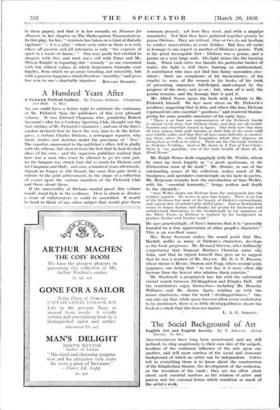A Hundred Years After
A Pickwick Portrait Gallery. By Various Authors. (Chapman
and Hall. • is. W.) •
No one could have a better right to celebrate the centenary of Mr. Pickwick than the publishers of this very pleasant volume. It was Edward Chapman who, pondering Robert Seymour's idea for a Cockney Sporting Club, thought out the first outlines of Mr. Pickwick's character ; and one of the firm's readers declared that he knew the very 'man to do the letter- press, a certain Charles Dickens, a newspaper reporter, who wrote stories and sketches under the pen-name of " Boz." The reporter, summoned to the publisher's office, fell in gladly with the scheme, but showed from the first that he had decided ideas of his own ; and the sagacious publisher realised that here was a man who must be allowed to go his own gait. So the bargain was struck that did so much for Dickens and for Chapman and Hall ; and now, a hundred years afterwards, though no longer at 186 Strand, the same firm puts forth a tribute to the joint achievement, in the shape of a collection of essays upon the various members of the Plckwiek Club and those about them.
If the universality of Dickens needed proof, this volume would stand high in the evidence. Here is about as diverse a team of collaborators as could be assembled. It would be hard to think of any other subject that would give them
common ground ; yet here they meet, and i with"a singtilar. unanimity. Not that they have gatheredlogetber piously praise Dickens. They are critical. One or two do not hesitatct
to. confess reservations, or even dislikes. But they all unite in homage to one aspect or another of Dickens's 'genius. Thik is' the great inescapable fact : Dickens was a genius, and a genius on a very large scale. His light shines like the burning; bush. When each critic has thrown his particular bucket of water, the light is still there, burning on undiminished..
contributor who does not find him funny surrenders else where ; there are complaints of his inconsistency, of his
'cruelty to some of the women in his books, of his trick of presenting characters full-fledged,. undeveloped by the progress of the story, and so on : but, when all is said, the
genius remains, and the. homage that is paid it. • -Mr. Alfred Noyes opens the book with a tribute to Mr. rickwick himself. He lays most stress on Mr. Pickwick's goodness, suggesting that in him, and others like him, Dickens expressed his own essential " goodness," and rendered thanks- giving for some possible encounter of his early days.
• !' There is at least one -representative of the Pickwick family in almost every story that Dickens wrote, and they are all tender- hearted and somewhat rotund in figure. One feels sure that they all have plump little gold watches in their fobs-of the most solid• and reliable make, and that they all have some difficulty in extract- ing them, after the cordial hospitality which they dispense to' themselves as well as to others. There are the Cheery-hie brothers in Nicholas. Nickletiy ; there is Mr. Lorry in A Tale of Two Citieti ; there is ' any guardian,' one of the most lovable of them all, lit Bleak House."
Mr. Ralph Straus deals engagingly with Mr. Winkle, whom he sums up most happily as " a great sportsman, in the Pielavickian sense of the word."--Mr.. Stonier, in one of the- outstanding essays of the collection, makes much of Mr. Snodgrass, and speculates convincingly on his taste in poetry.,
Mr. Betjeman remarks how the introduction of Sam Weiler, with his " essential humanity," brings realism and depth to the chronicle :
" Sam Weller draws out Dickens from the caricaturist into the realistic painter. Ho seems to give him leisure. There is no leis of the liveliness but more of the 1?eanty of Dicken's extraordinary and copious flow of unbelievably skilful prose. Just as Rowlandson seems to forget Syntax and display his genius for landscape acid architectural illustration in the backgrounds to his aquatints of the Three Tours, so Dickens is inspired by his background to produce livelier and lovelier work."
He says penetratingly, of Sam's humour, that it is -"generally, founded on a true appreciation of other people's character:" This is an excellent essay.
Mrs. Kean Seymour makes the sound point that Mrs.
Bardell, unlike so many of Dickens's characters, develops as the book progresses. Mr. Bernard Darwin, after brilliant conjecturing that Sergeant Buzfuz's Christian name was, John, and that he 'signed himself Jno, goes on to suggest that he was a nephew of Mr. Stryver. Mr. E. S. P. Haynes,; whose theme is Messrs. Dodson and Fogg, utters several quiet epigrams, one being that " in our day it is more often tile layman than the lawyer who admires sharp. practice."
Mr. Macdonell a vropriately has fun with the celebrated cricket match between All-Muggleton and Dingley Dell. All the contributors enjoy themselves—including Mr. Bransby Williams—and Mr. James Agate, winding up with the minor characters, coins the word " dividuppableness." One can only say that, while space does not allow every contributor to be mentioned, there is so little dividuppableness about the book as a whole that this does not matter. L. A. G. STRONG.-


































































 Previous page
Previous page